正说反译和反说正译
正说反译-反说正译
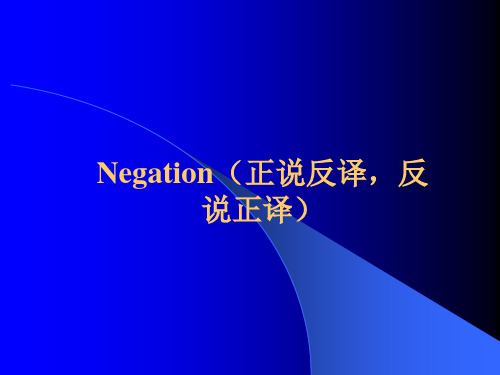
“It + be + adj. + noun + that…”句式的反面着笔 译法: (17) It is a wise father that knows his own child. 聪明的父亲也未必了解他自己的孩子。 (18) It is an ill wind that blows nobody good. 坏事未必对人人都有害处。 (19) It is a good workman that never blunders. 智者千虑必有一失。 (20) It is a long lane that has no turning. 凡事总有变化,还会永远不变。
(1) I couldn’t agree more. (2) You couldn’t be better off, could you? (3) Nothing is farther from the truth. (4) I can hardly imagine two men less capable of getting on together. (5) I was weighed down with grief; my friend’s books offered little release, less escape. (6) He could not care less about money.
(6) They didn’t praise him in the slightest. (7) I’m afraid not. (8) I don’t know how often I haven’t warned you. (9) His speech leaves much to be desired. (10) No news is good news.
翻译常用的八种技巧
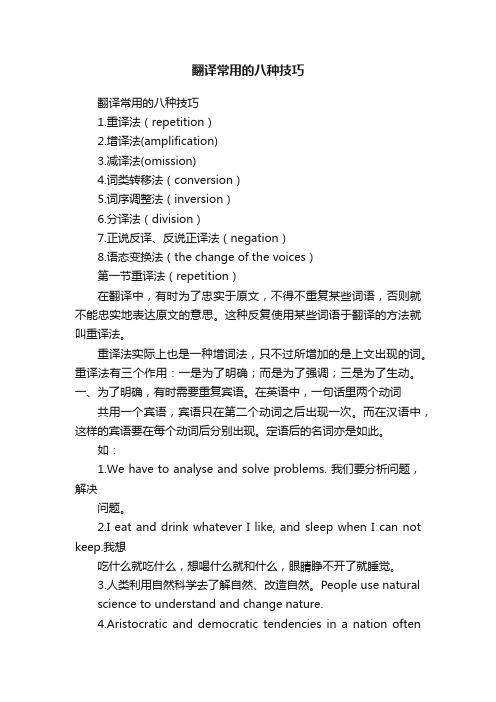
翻译常用的八种技巧翻译常用的八种技巧1.重译法(repetition)2.增译法(amplification)3.减译法(omission)4.词类转移法(conversion)5.词序调整法(inversion)6.分译法(division)7.正说反译、反说正译法(negation)8.语态变换法(the change of the voices)第一节重译法(repetition)在翻译中,有时为了忠实于原文,不得不重复某些词语,否则就不能忠实地表达原文的意思。
这种反复使用某些词语于翻译的方法就叫重译法。
重译法实际上也是一种增词法,只不过所增加的是上文出现的词。
重译法有三个作用:一是为了明确;而是为了强调;三是为了生动。
一、为了明确,有时需要重复宾语。
在英语中,一句话里两个动词共用一个宾语,宾语只在第二个动词之后出现一次。
而在汉语中,这样的宾语要在每个动词后分别出现。
定语后的名词亦是如此。
如:1.We have to analyse and solve problems. 我们要分析问题,解决问题。
2.I eat and drink whatever I like, and sleep when I can not keep.我想吃什么就吃什么,想喝什么就和什么,眼睛睁不开了就睡觉。
3.人类利用自然科学去了解自然、改造自然。
People use naturalscience to understand and change nature.4.Aristocratic and democratic tendencies in a nation oftenshowthemselves in its speech.民族的贵族倾向和民族倾向常在其言语中表现出来。
5.我们来修改安全规则和卫生规则吧。
Let’s revise our safety andsanitary regulations.二、英语常用省略,但为了明确,也为了强调某些内容,在汉语中常常要将省去的部分重译出来。
正说反译
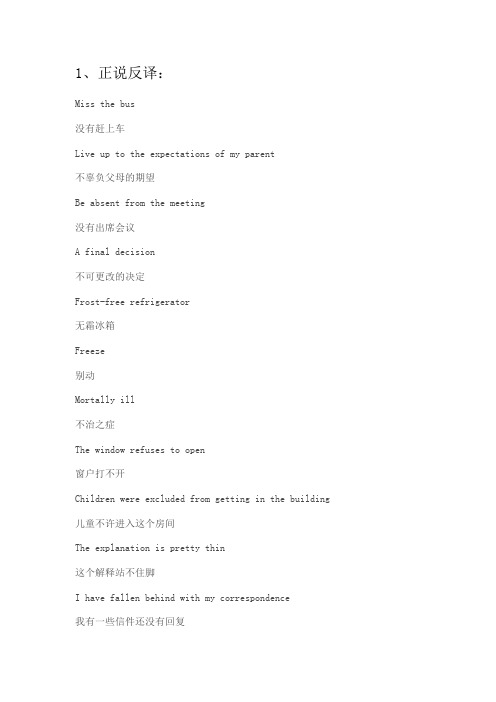
1、正说反译:Miss the bus没有赶上车Live up to the expectations of my parent不辜负父母的期望Be absent from the meeting没有出席会议A final decision不可更改的决定Frost-free refrigerator无霜冰箱Freeze别动Mortally ill不治之症The window refuses to open窗户打不开Children were excluded from getting in the building 儿童不许进入这个房间The explanation is pretty thin这个解释站不住脚I have fallen behind with my correspondence我有一些信件还没有回复Fully clothes, he fell across his bunk and was instantly sleep 衣服也不脱,他往床上横着一倒,不一会儿就睡着了Don’t lose time in posting this letter不要忘了寄这封信No deposit will be refunded unless ticket produced凭票退押金例1:原文:她忍住了没有笑出声。
译文:She refrained from laughing.例2:原文:花园根本无人整理。
译文:The garden was in a state of total neglect.例3:原文:我不能忍受你的脾气。
译文:Your temper is more than I can bear.例4:原文:他宁死不屈。
译文:He would die before yielding.例5:原文:生活远非净是乐事。
译文:Life is far from being a bed of roses.例6:原文:风景美得无以言表。
四种翻译方法,十种翻译技巧

四种翻译方法1.直译和意译所谓直译,就是在译文语言条件许可时,在译文中既保持原文的内容,又保持原文的形式——特别指保持原文的比喻、形象和民族、地方色彩等。
每一个民族语言都有它自己的词汇、句法结构和表达方法。
当原文的思想内容与译文的表达形式有矛盾不宜采用直译法处理时,就应采用意译法。
意译要求译文能正确表达原文的内容,但可以不拘泥与原文的形式。
(张培基)应当指出,在再能确切的表达原作思想内容和不违背译文语言规范的条件下,直译有其可取之处,一方面有助于保存原著的格调,另一方面可以进新鲜的表达方法。
Literal translation refers to an adequaterepresentation of the original. When the original coincides or almost tallies with the Chinese language in the sequence of vocabulary, in grammatical structure and rhetorical device, literal translation must be used.Free translation is also called liberal translation, which does not adhere strictly to the form or word order of the orig in al.(郭著章)直译法是指在不违背英语文化的前提下,在英译文中完全保留汉语词语的指称意义,求得内容和形式相符的方法。
意译是指译者在受到译语社会文化差异的局限时,不得不舍弃原文的字面意义,以求疑问与原文的内容相符和主要语言功能的相似。
(陈宏薇)简单地说,直译指在译文中采用原作的的表达方法,句子结构与原句相似,但也不排除在短语层次进行某些调整。
意译指在译文中舍弃原作的表达方法,另觅同意等效的表达方法,或指对原作的句子结构进行较大的变化或调整。
Negation(正说反译、反说正译)
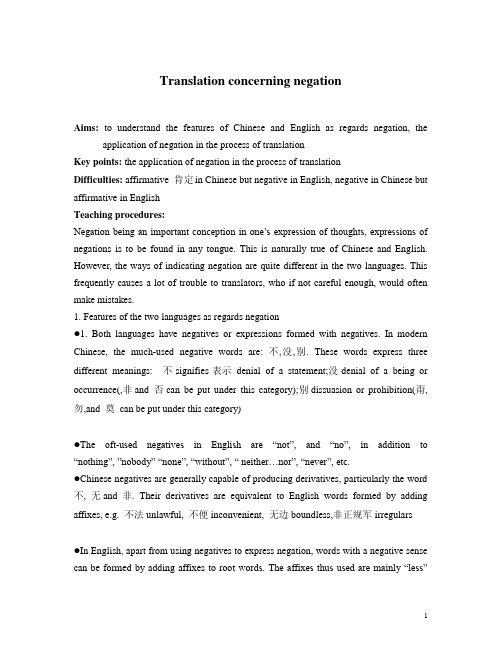
Translation concerning negationAims: to understand the features of Chinese and English as regards negation, the application of negation in the process of translationKey points: the application of negation in the process of translationDifficulties: affirmative 肯定in Chinese but negative in English, negative in Chinese but affirmative in EnglishTeaching procedures:Negation being an important conception in one’s expression of thoughts, expressions of negations is to be found in any tongue. This is naturally true of Chinese and English. However, the ways of indicating negation are quite different in the two languages. This frequently causes a lot of trouble to translators, who if not careful enough, would often make mistakes.1. Features of the two languages as regards negation●1. Both languages have negatives or expressions formed with negatives. In modern Chinese, the much-used negative words are: 不,没,别. These words express three different meanings: 不signifies表示denial of a statement;没denial of a being or occurrence(,非and 否can be put under this category);别dissuasion or prohibition(甭,勿,and 莫can be put under this category)●The oft-used negatives in English are “not”, and “no”, in addition to “nothing”, ”nobody” “none”, “without”, “ neither…nor”, “never”, etc.●Chinese negatives are generally capable of producing derivatives, particularly the word 不, 无and 非. Their derivatives are equivalent to English words formed by adding affixes, e.g. 不法unlawful, 不便inconvenient, 无边boundless,非正规军irregulars●In English, apart from using negatives to express negation, words with a negative sense can be formed by adding affixes to roo t words. The affixes thus used are mainly “less”suffix “un” “in”, and “non”●However, English words formed with affixes with a negative, while adjective and nouns formed with “un” such as “unavoidable” and “unbelief” are negative, for instance, verbs forme d with affixes such as “unclasp” and “uncork” affirmative.●In Chinese, words formed with negatives are generally negative in sense but in some cases they assume new meaning like 非常, which practically means 很.●In English, the same word formed with a different affix differs in meaning (compare discord with uncord). Sometimes, words formed with different affixes 词缀with a negative sense would produce words with different implications含义---derogatory贬义and the other non-derogatory褒义. For instance, immoral means 不道德,and is therefore derogatory while unmoral means 非道德,无道德观念的,and is therefore non derogatory. 1.W arm-up exercises2.I don't’ think Tom is correct.3.I don’t think Xiaoming is coming tomorrow.4.A re you not going tomorrow?---- No, I am not going .5.A frica is not kicking out W estern imperialism in order to invite other new masters.6.T he world today is far from peaceful.7.O ur PLA is worthy of being called a great army of the people.8.H e tried his best to overcome the lack of technical data.9.T he window refused to open.10.Y esterday he failed to get to school on time.11.They excluded children from getting in.12.The building is in a state of neglect.13.He is often absent- minded.14.To do this is beyond me.15.Lei Feng’s noble deeds are above all praise.16.I, rather than you , should do the work.17.The truth is quite other than what you think.18.She refrained from laughing.19.She was refused admitance by them.20.An opportunity is not likely to repeat itself.21.Live up to the expectations of our own people and the people throughout the world.22.Slips are scarely avoidable when you are new to your work.23.The meetings were marked by such an absence of lively discussions that at times they were almost on the piont of breaking up.24.Avoid operating the keys roughly.25.The scientists made a solemn plege at the conference, saying, “W e’ll forever live up to what our Party expecs of us.”26.The evidence is conclusive, excluding all possibilities of doubt.27.That fellow is far from being honest.28.Luan Ping stood still, trying vainly (in vain) to answer the battery of questions Y ang Zirong raised.29.That served to strenghen instead of weaken our determination.30.But for their help. W e should not succeeded in this experiment.31.All that glitters is not gold.32.All is not lost.33.All criminals are murderers.34.But aal men are born to reign.35.All that flatter you too much are not faithful friends.36.Both children are not clever.37.W e never thought of nothing wrong.我们从来没有想到有什么错误。
翻译技巧-B级考试

2. 将词义做具体化的引申(抽象—具体) 英语中有时候也用代表抽象概念或属性的词来表示 某种具体事物,译为汉语中应做具体化的引申.
• She respects him for what he is, not for what he has. • The Great Wall is a must for everyone to visit Beijing. • The car in front of me stopped and I missed the green.
2、省词 为了避免行文拖泥带水,有时需删减个 别可有可无的或违背汉语表达习惯的词句, 但绝不能把原文中的思想内容省去。 一般来讲,英语中的冠词、连词、介词、 泛指的人称代词、重复出现的人称/物主代 词往往可以省略;引导主语从句、宾语从 句的that、强调句中的it等一般可以省略。
• While reading, do not allow yourself to regress, but keep reading ahead in every sentence, even when you come across a new word. • If winter comes, can spring be far behind? • Smoking is prohibited in public places. • There was no snow, but the leaves were gone from the tree, and the grass was dead. • 阅读时,不要回头读;即使遇到一个生词也应该继 续往下读。 • 冬天来了,春天还会远吗? • 公共场所不许吸烟。 • 天未下雪,但已经叶落草枯。
四、增词和省词
1、增词 是根据语言结构、语义、语气和文 化背景的需要增加一些词来更忠实 通顺地表达原文的意思,将原文中 的“隐含成分”表达出来。但,不 能无中生有地随意增词。
7正反、反正译法
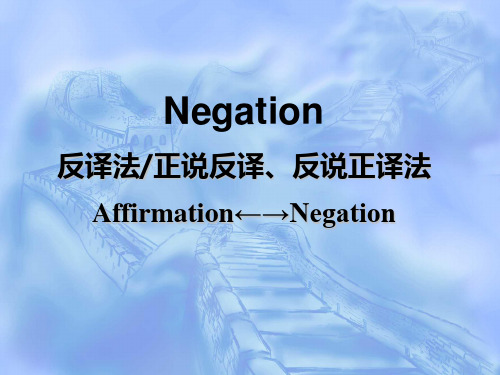
【译文】凡是活在世上的人都曾有过神仙般 的几段绝好时光。(双重否定表示强烈肯定)
12
例5:The significance of these incidents wasn’t lost on us.
【译文】这些事引起了我们的重视。
例6:He has no small chance of success.
【译文】她忍住没有笑。
例5:The thick carpet killed the sound of my footsteps. 【译文】我走在厚厚的地毯上一点儿声 音也没有。
18
例6:The pursuit of science withdraws interest from external things. 【译文】科学家由于致力于科学研究, 对外界事物总是不感兴趣。 例7: My guess is as good as yours. 【译文】我的猜测并不比你的高明。
14
课堂互动1: 翻译句子, 注意否定译肯定
1.Students, with no exception, are to hand in their papers this afternoon. 【译文】今天下午,学生统统要交上书面作业。 2.Styles come and go, but good taste is timeless. 【译文】文风随时在变,而文雅是永恒的。 3.All the articles are untouchable in the museum. 【译文】博物馆内一切展品禁止触摸。 4. No one has nothing to offer to society. 【译文】人人对社会都有所贡献。(双重否定用 来表示强烈肯定)
正说反译、反说正译法

• 老师发现有些学生不在。
精品..
正说反译法(形容词)
• She said angrily,the men are all bad! • 她愤愤地说,男人都不是好东西! • You are a bad boy! • 你是个不听话的孩子! • The company’s failure was due to bad
• He is above meanness and deceit. • 他不至于做卑鄙和欺骗人的事情。
• Her behaviour was above suspicion. • 她的品行不容怀疑、
精品..
正说反译法(虚词)
• Few of my friends speak French. • 我的朋友中几乎没有人说法语。 • This was the last place the colonialists
• The revolutionaries were beaten,refused anything to read,kept for a time in semidarkness as well as in chains.
• 那些革命者当时受到拷打,不准阅读任何书刊..
• The window refuses to open. • 窗户打不开。
trying to avoid you ? • 你知道她为什么总是不想见到你吗? • He tried to avoid answering my
questions. • 他试图避而不答我的问题。
精品..
正说反译法(形容词)
• There are two aspects to everything,to say there is only one is to be aware of one aspect and to be ignorant of the other.
- 1、下载文档前请自行甄别文档内容的完整性,平台不提供额外的编辑、内容补充、找答案等附加服务。
- 2、"仅部分预览"的文档,不可在线预览部分如存在完整性等问题,可反馈申请退款(可完整预览的文档不适用该条件!)。
- 3、如文档侵犯您的权益,请联系客服反馈,我们会尽快为您处理(人工客服工作时间:9:00-18:30)。
8. 正说反译和反说正译
正说反译
正说反译和反说正译的实质是从逻辑上改换说法。
由于语言所反映的心理因素和不同语言的情调往往要求译者改换说法。
英汉互译中,为了达到功能对等,增强语言交际效果,常常采用这两种技巧
We will live up to what our parents expect of us.
我们不能辜负父母的期望。
If you forward the transcripts yourself, they can be considered official only if the school envelope has remained sealed.
如果本人递交证件,则本人不得擅自拆封,否则证件将被视为无效。
如果自己提交档案,学校的密封信封必须加盖公章、完好无损,否则无效。
Private! 闲人免进!
Keep upright! 切勿倒置!
Wet paint! 油漆未干!
Urban clearway! 市区通道,不准停车!
Inflammables—keep away from fire. 易燃物品,切勿近火!
I prefer the red one to the black one. 我要红的,不要黑的。
The news of the assassination of President Lincoln spread like wildfire.
林肯总统遭到暗杀的消息不胫而走。
The plan cracked up through a bad landing.
飞机因着陆不当而撞毁。
Fully clothed, he fell across his bunk and was instantly sleep.
他不脱衣服,往床上一躺就睡着了。
I have fallen behind with my correspondence.
我没有及时回复信函。
Sleeping too long is a lame excuse for being late.
睡眠过久不利于健康。
These visits will operate only if weather permits.
以上参观项目天气不好就取消。
反说正译
I do not doubt that he will be appointed sales manager of the company.
我相信他将被委任为公司的营业主任。
No refunds or exchanges without complete factory packing and sales slip.
凭票退还押金。
We consider there is no material but will deform more or less under the action of force.
我们认为,各种材料在力的作用下总是要或多或少发生变形。
She never comes but she brings something for the children.
她每次来都要给孩子们带些东西。
This book could not have been written or published without the help of dozens of people, and I am deeply grateful to all of them.
本书的写作和出版曾得到十多位友人的帮助,谨此一并表示感谢。
